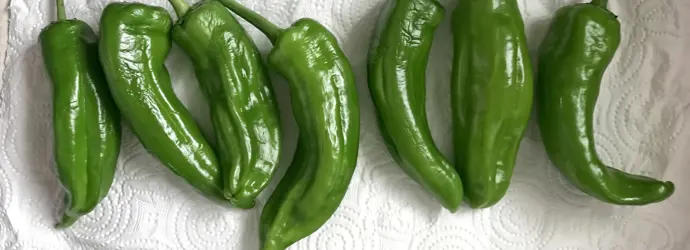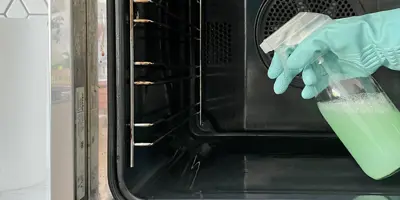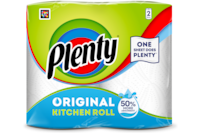2 people found this helpful

There’s nothing quite like the crispness and flavour of fresh vegetables. Unfortunately, there’s also nothing quite like delving into the punnet of mushrooms to scoop out a hearty handful of grey, furry mould. Sigh.
Whether you’re storing vegetables in fridge compartments or cupboards, with the right know-how you’ll be able to enjoy your favourites for longer. So, how long do fresh vegetables last, and how can you keep them at their best in storage? Find out here.
How long do fresh vegetables last?
Floppy, soggy lettuce? Smushy, squishy carrots? Potatoes that have grown their very own set of horns? There’s no catch-all answer to this question – and you can usually tell just by looking at most veggies, but fresh vegetables can be split into a few different categories of longevity:
- 1 month (in cool, dark conditions): Potatoes, onions, turnips, carrots
- 2-3 weeks: Beets, celery, peppers
- 1 week: Cucumbers, lettuce, cauliflower, cabbage
- Less than a week: The majority of fresh vegetables; including tomatoes, aubergine, beans, summer squash, spinach
To help your vegetables last as long as possible, there are a number of key tips that’ll help stop your veg from spoiling (and we mean the 'going off’ kind, not the ‘ruining the ending of your favourite TV show’ kind):
- Keep them out of direct heat and sunlight.
- Give them as much air and room as you can.
- Remove any vegetables that have started growing legs, are split in a massacre of mush behind the butter, leaking sludge, or showing signs of mould immediately, so as not to spoil the entire batch.
Where to store vegetables
One of the key components when it comes to the best way to keep vegetables fresh is knowing how to store vegetables of different types. Different vegetables react differently in different environments. Some do better in the fridge, whereas others stay fresher in kitchen cupboards or pantries. And some, like cucumber, are best in a sandwich or even an ice-cold glass of something on a Friday night.
The clue is in the name - Iceberg lettuce, believe it or not, likes to be kept cold! In terms of storing vegetables in fridge compartments, the following examples do best in colder temperatures:
- Celery
- Peppers
- Broccoli
- Cauliflower
- Salad leaves
- Carrots
- Mushrooms
But this isn’t the best way to store all vegetables. Some veggies are best kept in the dark (who knows who they might expose your secrets to?). Cool, dark kitchen cabinets are a better home for cold-sensitive veggies, including the following:
- Onions
- Garlic
- Potatoes
- Turnips
How to store vegetables using kitchen paper
So that’s where to store vegetables covered, now onto some handy tips for the best way to store vegetables to keep them fresh. Plenty kitchen paper is a great tool for keeping vegetables fresh because of its strength and absorbency. Here are two examples of how you can use this kitchen staple to keep your veggies fresh:
- Wrap individual vegetables in paper to keep them protected. The more contact veggies have with each other (especially if they’re giving off moisture), the quicker they lose their freshness. Use pieces of Plenty kitchen paper to gently absorb all that excess gunk from your butternut squish, without drying it out, to keep your veggies fresh for longer.
- Line containers with kitchen towel. This is relevant for anything that comes in a punnet-style container: tomatoes (yes, we know that they’re technically a fruit!), mushrooms, etc. By simply sticking a sheet of paper at the bottom of the container, you’ll soak up any extra moisture and help stop mould from forming quickly – because we all know how disappointing it is when we reach for the raspberries and we’re met with a sea of furry, fluffy mould. Change the kitchen towel frequently to make the veg last even longer.
Tip
Plenty kitchen towel is great for wrapping vegetables for storage. The combination of being super-strong and super-absorbent is perfect for keeping sliced veg fresher for longer.
Kitchen roll is not only handy for storage; it’s also great for prep. Try these tips for keeping your fresh vegetables in tip-top condition:
- If you’ve dragged your root vegetables through the mud to get here, use a sheet of Plenty kitchen paper to help wipe them down before they go into storage.
- When you’re storing vegetables after washing them, always be sure to pat them dry with some kitchen paper first. Lining the container with a sheet will also help to absorb more water and prevent them from going prematurely soggy.
- On the other hand, if you’re pre-prepping vegetables for later, you can prevent them from drying out before cooking by dampening a sheet of kitchen paper to wrap them in and wrap sliced vegetables in them.
What to do with rotting vegetables
You’ve fought the good fight and kept your veg fresh for as long as possible, but sometimes a rotten potato or a carrot is inevitable. We’re only human! Once your vegetables are no longer fresh and have reached the end of their usable life, composting is a great way to give them a second life as nutrient-rich soil for your garden.
Composting vegetable scraps not only reduces waste but also helps to enrich the soil and promote sustainable gardening practices. It really is a win-win solution. If you’re wondering to yourself, ‘How on Earth do I compost?’, don’t worry, we’ve written an article that explains what composting is and how it works.
Not sure what you can put in your compost bin, we’ve also covered that here. If you’re already a composting pro – well done! If you’re not, we can’t wait for you to discover the satisfaction that comes along with repurposing waste into something useful, all from the comfort of your home.
Tip
We love composting so much that Plenty’s kitchen roll sheets are now certified compostable* for your compostable messes! Next time you use Plenty Original on a compostable mess – throw the sheets in the compost pile. With a bit of patience, they’ll be ready to enrich your soil in no time.
Want to know more about Plenty’s compostable kitchen roll sheets? Check out the answers to your frequently asked questions.
You should have a much better idea now about the best way to keep vegetables fresh, and how handy kitchen paper can be for the job. Put these tips into practice and you’ll find you’re seeing far less of that furry monster at the back of the fridge!
*Plenty kitchen towels are certified as home and industrially compostable according to NF T 50-800 and EN14995.
Related articles
How to wash fruit and vegetables at home
If you’d like to learn how to clean fruits and vegetables properly this is the article for you. Follow our step-by-step guide to washing fruit & veg here.

Kitchen Safety Rules
Want to enjoy the fun of cooking with all the family? Learn some basic kitchen rules, so you can all cook the safe way and not have to worry about accidents!

10 of the best freezer meals to make ahead
Save time and money by creating your own tasty and easy freezer meals. Our guide runs you through 10 freezer meal ideas you can make at home, here.

How to make a natural oven cleaner
Discover a natural way to clean oven interiors and parts. In this guide you’ll learn how to mix two versions of a natural oven cleaner and how to use them.

How to sterilise jars: 3 ways to sterilise jam jars in minutes
Are you in the mood for some homemade jam but have no jar? Well, fear not, here at plenty we’ve got 3 handy tips on how to sterilise jars. Jamtastic!

How to make salt dough for kids
Have hours of fun with your pre-schooler by making salt dough and getting creative with these salt dough ideas. Read on for a simple recipe.


